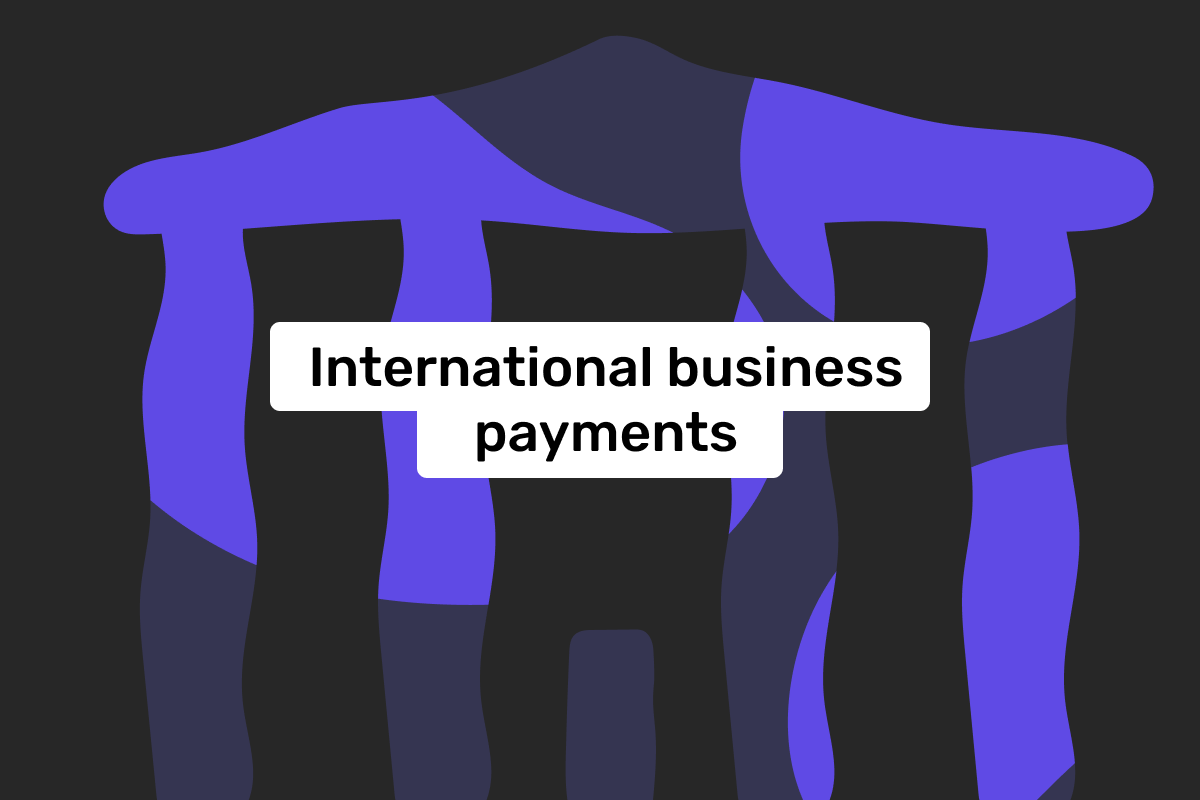Genome Blog / articles / International business payments: a comprehensive guide for 2024
Sep. 26, 2024
Cross-border transactions are one of the main pillars that make business truly international.
Companies of all sizes constantly engage in international payments, navigate through currency conversions, and use different payment methods.
In this article, our team will cover the most common ways to make cross-border payments and explain how international payments work.
What are international business payments?
International business payments are financial transfers made between companies or companies and individuals for business purposes. The payer and the beneficiary are located in different countries, so such transactions are considered international.
Many transaction types can fall under the broad international business payment umbrella. The simplest example is a company that needs to pay overseas suppliers for raw materials. Sending salaries to the employees is also considered a business payment. A business can require a subscription service for their corporate needs and pay for it – a business transaction.
Before we dive deeper into the topic, let’s go through the main elements of international payments.
Currency exchange. In many cases, you will need to convert currencies, as international payments can often happen between countries with different national currencies. Fortunately, the foreign exchange process usually happens automatically when you send money via a bank or a payment service provider.
Payment methods. Cash, direct transactions, SWIFT, SEPA, ACH transfers, cryptocurrencies – all the options mentioned are payment methods you can use to make an international business payment.
Payment processors. These are fintechs and services that are used to execute cross-border payments, usually via an international payment gateway.
Compliance and regulations. When you deal with corporate funds, compliance and regulations are crucial, as banks need to adhere to them to provide secure financial services. Adhering to legal standards like anti-money laundering (AML) rules and Know Your Customer (KYC) requirements is also a must for banks and other providers.
Fees and costs. Last but not least, business transactions usually come with higher service fees and expenses related to currency conversion, processing costs, and intermediary charges.
Methods of international business payments
When making international business payments, various payment methods have different advantages and challenges. Below are some of the most common approaches used to transfer money abroad, along with their pros and cons. Our team will also explain how these international payments work.
Bank wire transfers
Traditional bank transfers are payments made from one bank account to another and are usually synonymous with wire transfers. Basically, it is a transfer option provided by your bank. A bank transfer is very common around the world, as banks transfer money between their subsidiaries.
Thus, international wire transfers are payments between bank accounts that are located within different countries. International bank transfer methods may vary based on how fast they’re carried out and their cost. Usually, it takes 2-3 days for business international payments to reach the recipient’s account.
Benefits:
- Reliable and secure;
- Allow for large payment amounts;
- Widely accepted around the world.
Drawbacks:
- An international bank transfer operation may be costly, especially for currency conversion;
- Sometimes, they take several days to process if the destination country is too far away.
SWIFT payments
SWIFT (the Society for Worldwide Interbank Financial Telecommunication) is a messaging network used to transfer payment details that allow people to send money internationally. SWIFT transfers are very widespread, as the network allows clients to pay in more than 200 countries and territories.
A SWIFT code (aka Bank Identifier Code) is required to make an international payment, as it contains information about the bank account the money is sent to. A SWIFT international business payment can be executed within 1 to 3 business days but can take longer if the payment destination is too far or multiple countries and intermediaries are involved.
Benefits:
- Secure and widely accepted;
- Supports large transactions;
- Supports dozens of currencies.
Drawbacks:
- Might be expensive, with high costs for both the sender and recipient;
- Involves intermediary banks, adding to the transfer execution time.
ACH transfers
This payment option is more well-known among our American readers. ACH payments (Automated Clearing House) are an electronic network used for transferring money between US bank accounts, commonly for payroll, bill payments, and government benefits.
ACH transfers are more commonly used for sending money domestically and are processed within 1-2 business days. International payment is possible through International ACH Transactions, which American banks use to transfer money electronically to financial institutions outside of the country. However, these are less common, slower, or more complex than other international payment methods like bank transfers or SWIFT.
Benefits:
• Way lower charges compared to wire transfers;
• Ideal for smaller, recurring payments.
Drawbacks:
• Mostly used in the US;
• International payments are slower than other payment methods;
International checks
Checks are still used in some parts of the world for international payments and business money transfers, though their use has significantly diminished due to the rise of faster and more secure digital payment methods.
International checks involve sending a physical paper check between countries, often taking weeks to clear due to processing delays, currency conversions, and differing banking systems.
Additionally, they can incur high fees and carry risks of loss or fraud. As a result, most businesses and individuals now prefer electronic transfers over checks for cross-border transactions. Currently, their only advantage is that they are relatively easy to use.
Cryptocurrencies
Cryptocurrencies can also be used for international business payment methods thanks to their decentralized nature. Cryptocurrencies are not controlled by any central authority or government. Thus, you can send and accept international payments faster, as cryptocurrencies bypass traditional financial systems and minimize bank charges and delays.
Additionally, thanks to blockchain, this international payment is more secure and fraud-resistant.
Advantages:
- No intermediaries, reducing costs;
- Fast transactions, often completed within seconds.
Drawbacks:
- Volatile exchange rates can lead to value fluctuations;
- Regulatory uncertainty in many countries.
How to choose the right international business payment method
When selecting a transfer method for international payments, consider the following factors:
- The payment speed. Consider how quickly you need the payment to be processed and plan ahead if public holidays are coming. If it is an urgent method, consider selecting SEPA Instant Transfers or quick bank transfers to save time.
- How frequent your transfers will be. Consider this carefully because not every payment provider allows you to send out international payments in hundreds or thousands in one day.
- Transaction limits. Some banks and financial institutions set limits on the amount you can transfer via an international payment.
- Fees and costs. Compare rates and charges of different transfer options and select the most reasonable one to save funds. Look out for hidden fees.
- Currency exchange rates. Currency exchange can significantly increase the cost of your international payment. Try to seek fair exchange rates when planning your next payment.
- Security. Most of the business money transfers are very well protected from fraud. However, it is always important to check if your financial institution complies with banking rules and regulations before partnering with it.
Top providers for international business payments
The best business bank account for international payments is the one that provides multiple money transfer options, as well as additional business features to manage finances.
Need multiple options for international transfers inside your business account? Try Genome. Businesses get access to a dedicated IBAN (International Bank Account Number) for their international business payments.
Start accounts in different currencies, up to 5 accounts per currency (EUR, USD, GBP), and exchange currencies between them for the most beneficial money transfers.
Your business can send and receive international payments, such as SWIFT, TARGET2, Faster Payments, CHAPS, and more – just get the account details, and we can access cost-effective payments.
In addition, Genome also offers SEPA credit and instant transfers, if you need to make quick and effective euro payments across the EU!
How to manage currency exchange risk
Even if you use the best methods, currency exchange risks are inevitable when dealing with international business payments. Let us share some tips to minimize them:
You can lock in a specific foreign exchange rate for a future date, reducing exposure to currency fluctuations – it is called forward contracts.
Also, you can get different currency options. This service allows you to exchange currency at a pre-agreed rate, offering flexibility and protection.
You can try multi-currency accounts if these two options are not for you. They allow individuals and businesses to store and send money in multiple currencies. This way, you are likely to avoid conversion fees when conducting transactions in different currencies.
Typical fees and costs for cross-border payments
Unfortunately, currency conversion is not the only expected expense you will have to pay. Cross-border payments can involve several charges, such as:
Transfer fees. Charged by service providers for processing the payment. Usually, different transfer methods have different fees, depending on the payment destination and the number of intermediaries involved.
Currency exchange fees. Yes, besides currency conversion, you might have to pay additional charges for that service.
Intermediary bank fees. Businesses can incur additional charges when payments pass through multiple intermediaries, which can be quite common for global payments.
Compliance and regulatory considerations
Every financial institution must comply with multiple regulations to protect its clients’ data and money during international payments and while using other financial services. The most important regulations to keep clients completely safe are:
- Know Your Customer (KYC). Businesses and individuals must verify their identity before joining a bank or a PSP and using international payment services.
- Anti-Money Laundering (AML). These regulatory frameworks implemented by traditional banks and PSPs prevent illegally earned money from being used or transferred.
- Foreign exchange controls. Some countries regulate the flow of currency in and out of their economies. In most cases, limits are set on the windrowing dollar, euro, and other strong currencies.
- Tax regulations: International transactions may be taxed in some countries.
- Data protection laws: Payment data must be securely processed in accordance with privacy laws like GDPR.
Common challenges and how to overcome them
Businesses of any size in any county will face some of these issues at some point when they pay or receive transfers.
- High charges. Companies will sometimes need to deal with the following dilemma: costly but fast, unlimited transfers, or slower but cheaper options. Try picking middle-ground options like same-day or instant SEPA transfers.
- Currency volatility. Try using multi-currency accounts to manage issues related to high conversion costs.
- Payment delays. Consider providers offering faster transfer options and better transaction tracking.
- Compliance. Stay updated on regulations in both the sender’s and receiver’s countries to avoid penalties.
Key takeaways
In conclusion, international transfers are essential for businesses and provide multiple methods like wire transfers, SWIFT, SEPA, and other options. Managing currency exchange risks and complying with regulations is critical, as well as comparing a fixed rate and additional charges. Also, when choosing a business account, pay attention to other financial features it offers.
FAQs
How long do international payments take?
International payments can take anywhere from a few seconds to several business days, depending on the provider and the payment method used. SWIFT payments can take up to five days, while SEPA Instant Transfers can do it for a few seconds. Also, it all depends on the payment provider and its capabilities.
How can I avoid high fees on international payments?
It is simple: compare different payment providers and their competitive rates. Choose those with lower transfer costs. Using multi-currency accounts can also reduce currency conversion fees.
What are the risks of international business payments?
Key risks include foreign exchange fluctuations, delays in payment processing times, fraud, and compliance issues.
What documentation is required for international business payments?
Not always, but in some cases, the required documentation will include invoices, proof of identity, tax identification numbers, and, in some cases, contracts or agreements outlining the payment details.
How do exchange rate fluctuations impact international business payments?
Exchange rate fluctuations can increase the cost of international payments by changing the value of the currency being transferred. If you’re aiming for the reduced fees, you definitely need to monitor the rates.





